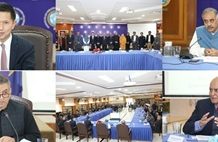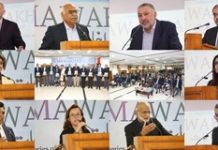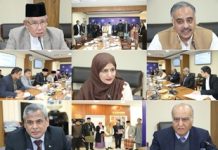Launch of the book on “88 Days to Kandahar: A CIA Diary ”
by Robert L. Grenier
March 11, 2016
The Institute of Strategic Studies, Islamabad (ISSI), organised launch of the book “88 Days to Kandahar: A CIA Diary” by Robert L. Grenier today at the Marriott Hotel. The speakers on the occasion included; Ambassador Mohammad Sadiq, Secretary National Assembly Division, PM Secretariat; Lt. Gen. Javed Alam (Retd.), Mr. Zahid Hussain, senior journalist, and Mr. Robert Grenier, former CIA station chief in Pakistan and Afghanistan.Ambassador Masood Khan, Director General, ISSI, in his welcome remarks noted the various issues Pakistan was dealing with presently. He highlighted how Pakistan has always remained very steadfast and very committed to the peace process in Afghanistan. Even though at first Islamabad was reluctant to get involved, primarily because it didn’t want to instigate an Afghan civil war, the Pakistani government were persuaded foremost by the Afghan leadership – both present and their predecessors. A formula now known as the ‘Quadrilateral Coordination Group’ is being pursued and so far has been a good experiment. He also talked about whether the US government will stick to their present policy or adopt a different policy post the upcoming presidential elections. Ambassador Masood also talked about the implementation of the China-Pakistan Economic Corridor (CPEC), and stated that this mega-project will be transformative for the whole region. Therefore, Pakistan’s main focus is on economic connectivity and finding security through economic prosperity and connectivity.
Ambassador Masood Khan, Director General, ISSI, in his welcome remarks noted the various issues Pakistan was dealing with presently. He highlighted how Pakistan has always remained very steadfast and very committed to the peace process in Afghanistan. Even though at first Islamabad was reluctant to get involved, primarily because it didn’t want to instigate an Afghan civil war, the Pakistani government were persuaded foremost by the Afghan leadership – both present and their predecessors. A formula now known as the ‘Quadrilateral Coordination Group’ is being pursued and so far has been a good experiment. He also talked about whether the US government will stick to their present policy or adopt a different policy post the upcoming presidential elections. Ambassador Masood also talked about the implementation of the China-Pakistan Economic Corridor (CPEC), and stated that this mega-project will be transformative for the whole region. Therefore, Pakistan’s main focus is on economic connectivity and finding security through economic prosperity and connectivity.
The speakers talked about how the book had done an admirable job of recording the events post 9/11 and that it presented an interesting and candid narrative. They were unanimous in their views that it provides an insight into the workings of the CIA and gives a holistic account of the Afghan war. The fact that the US invasion created a new set of issues, while the old issues still existed is also highlighted. The speakers talked about the importance of focusing on issues pertaining to drug production and trafficking. This, they said, is meaningful because wars not only create but further fuel the drug culture in the country. The speakers spoke about the ongoing efforts to bring the Taliban to the negotiating table and stated that if these fail, it may lead to more bloodshed and may eventually fulfill the prophecy of a ‘third’ American Afghan war taking place. Furthermore, they laid heavy emphasis on the fact that Pakistan has had to pay a heavy price for the on-going war in Afghanistan. In spite of the fact that Pakistan has helped in bringing about regional stability and greatly aided the international community, it still faces heavy criticism and its efforts are not given due recognition.
Mr. Grenier spoked about how the book is meant to “inform” the present and future policy makers on the region of the practical lessons learned in what he called the ‘First’ American Afghan War, and the events that led to the failures of the Second, so that they may be useful in making future decisions. He further talked about how the US strategy changed between the first invasion in September 2001, during which it sought to include local stakeholders and its second major campaign against the Taliban in 2005, when it tried to lead operations more unilaterally. He said that in the ensuing years up until today, the United States has failed to strike the right balance for empowering Afghan leadership, as Washington’s attention has shifted elsewhere to focus on the threat of global jihadists. Mr. Grenier also expressed concern that Afghanistan will remain a safe haven for terrorists if the relatively new centralised government is unable to exert control over its provincial territories. He also pointed out how the present government in Afghanistan is facing a situation similar to the one its predecessor did. In conclusion, he pointed out that at the end of the day only the Afghans have the power to bring peace and stability to their country. However, immense patience is required for this to come about. Therefore, it was critical that the international community, particularly the United States and other important stakeholders remain committed to ensure that terrorists do not find a foothold in Afghanistan.
In their concluding remarks the panelists spoke about how the Afghans need to unite as one group and come up with a unanimous joint plan. One step which may bring peace to Afghanistan is creation of a ‘peace lobby’. None exists at the moment. Bringing peace in Afghanistan is of immense importance because it has both direct and indirect repercussions on peace in Pakistan and the region.
Ambassador Masood Khan, DG, ISSI in his concluding remarks said that both the CIA and the Inter-Services Intelligence (ISI) are indispensable arms of their respective governments. They have been partners for a long time and even though there have been sporadic difficulties these are simple ‘quarrels in the family’. He emphasised that peace and stability cannot be delivered on the battlefield and avenues for dialogue will have to be found; and resilient institutions need to be built. He said that Pakistan cannot develop economically unless there is peace is Afghanistan. This derivation compels Pakistan to invest in peace and stability in Afghanistan. Pakistan, he concluded, looks forward to a robust relationship with the United States of America, and both countries need to benefit from each other’s strengths.
Arhama/03112016












